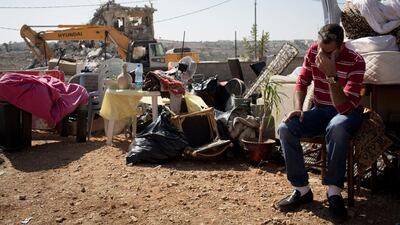House demolitions occur regularly in East Jerusalem, well away from the tourist path. According to the United Nations, Israel destroyed 190 Palestinian homes in 2016 and displaced thousands of people. It was the highest figure since 2000.
I’ve witnessed Palestinian families thrown out of their own houses, sometimes immediately replaced by radical, Jewish settlers, or standing in front of crushed, concrete structures with nowhere to go. Last year, a few hours after a Palestinian home was demolished in the neighbourhood of Wadi Joz, I arrived to find a solitary man sitting under a large, green plastic sheet. He had 12 children and a wife and all his possessions, including couches, fridge, table, crockery and cutlery, were exposed to the elements. “The Palestinian people don’t help me”, he said. Despite his situation, he gave me a cup of hot coffee and then began calling friends to see where he could sleep with his family.
The official policy of Jerusalem mayor Nir Barkat is to make Jerusalem the “united capital”. In practice, this means the approval of thousands of Jewish homes in West Jerusalem, but nothing in the East where Palestinians live. Up to 20,000 Palestinian homes have been built without approval, giving Israel the justification to destroy them, but obtaining permits is almost impossible. It’s a daily reality faced by a Palestinian community that foreigners and Israeli Jews almost never witness nor want to.
To a Jew growing up in Australia, this Jerusalem is vastly different to the fantasy Jewish city described in my youth, although it remains a sparkling and beautiful place. I’m preparing to leave after living here with my partner for more than a year. During this time and in the course of many visits over the past decade, I constantly marvel at the shimmering Al Aqsa Mosque, cobbled streets in the Old City and the green and brown hills of the Mount of Olives. With few tall buildings and its famed cream-coloured stone, the city has a spiritual feeling that is perhaps unrivalled in the world.
However, the brutal politics of division sucks away any inkling of nostalgia. The ubiquitous presence of armed and aggressive Israeli soldiers and police harassing Palestinians increasingly defines it. Many secular, Jewish Israelis hate Jerusalem and try to avoid coming. For them, the comfortable bubble of Tel Aviv is preferable, where the occupation of Palestine is almost completely invisible. They like it that way, away from Palestinians and the ultra-Orthodox, Haredi Jews who ghettoise themselves in isolated neighbourhoods.
As Israel prepares to celebrate 50 years of conquest and occupation of the West Bank, Gaza and East Jerusalem, since the 1967 Arab-Israeli war, this holy city has rarely been so angry and volatile.
Recently released documents revealed that Israel knew from the beginning of its occupation that it was illegal and worried about international reaction. Israel annexed East Jerusalem three weeks after the 1967 war and sent a telegram to its ambassadors around the world explaining that this wasn’t “annexation” but “municipal fusion” to guarantee running services. Israel needn’t have been too concerned, though, because facts on the ground after 50 years have become permanent.
As a journalist in Jerusalem, it’s a strange experience and almost guaranteed to bring cognitive dissonance. It’s possible to spend time in Gaza, the West Bank and East Jerusalem during the day, witnessing suffering and occupation and be safely back at home in the evening. Considering what surrounds us, Jerusalem is perhaps too comfortable for foreign media.
For Palestinians living in East Jerusalem, the city can be a dark experience. I live in Sheikh Jarrah, a Palestinian neighbourhood in East Jerusalem that’s slowly being taken over by extremist, Jewish settlers. There are plans to build a religious school, a 10,000-square-metre complex in the heart of an Arab area, and accelerated moves, backed by the Israeli Supreme Court, to evict even more Palestinians from their homes. The clear Israeli aim, used over decades, is to make Palestinian lives so miserable that they simply pick up and leave. Some agree, most resist.
There may be no checkpoints separating East and West Jerusalem, unlike throughout the West Bank, but the divides are clear. The vast majority of Jews here have no interest or knowledge of Palestinian history before the 1948 Nakba.
Israel is pushing for millions more tourists in Jerusalem in the coming decades, but this can only be achieved by isolating and silencing Palestinian residents, many of whom lost residency unless they regularly proved that this city was their “centre of life”.
Jerusalem will seduce even the most jaded traveller, but only the blind can ignore the racial and political discrimination undertaken in the name of Zionism.
Antony Loewenstein is a Jerusalem-based journalist and author, most recently, of Disaster Capitalism: Making A Killing Out of Catastrophe.

